Witness Rundown in Hollywood Trial
With a Week to Go, Here's What Everyone So Far Has Testified
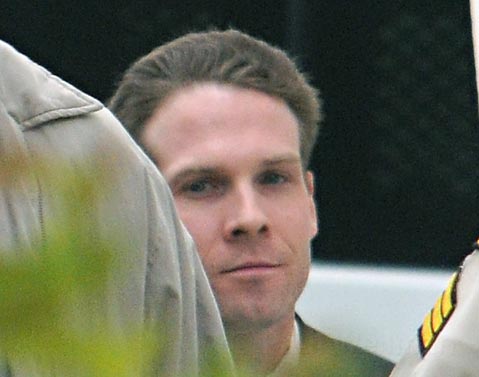
fences and walls.
Since the Jesse James Hollywood trial started on May 18, prosecutors Joshua Lynn and Hans Almgren have been calling witnesses to testify in front of a jury of nine women and three men. The two are attempting to prove beyond a reasonable doubt that Hollywood kidnapped 15-year-old Nicholas Markowitz in the summer of 2000 and then had Ryan Hoyt shoot and kill the teenager at Lizard’s Mouth, a popular hiking spot in the mountains above Santa Barbara.
Dozens of witnesses took the stand, from Hollywood’s friends and an ex-girlfriend to his family lawyer, forensic investigators, and the victim’s father and stepbrother. As the defense attorneys this week prepare to call their own witnesses – and, they predict, conclude their case by the end of the week – we’re presenting this review of what’s been said so far on the stand. Though not meant to be 100 percent conclusive, this synopsis includes almost all of the witnesses and mostly in the order that they were called.
Jeffrey Markowitz
The father of Ben and Nicholas Markowitz, he tried to keep his two children apart, due to Ben’s criminal history. However, he said that they loved each other and that Nicholas Markowitz would often run away and spend the night at his half brother’s apartment. On August 5, 2000, Jeffrey and Susan Markowitz, who is Nicholas’s birth mother but not Ben’s, confronted the victim about a bag of drugs in his pocket. Nicholas asked if they could wait to discuss it the following morning. But Nicholas left his house the next day, before the family could talk.
Pauline Mahoney
She called 911 on August 6, 2000, saying she saw a group of men beating up another in the spot in the San Fernando Valley where Markowitz was kidnapped. She also remembered the license plate number on the car. Her 911 call was played in court.
Brian Affronti
Already having plans to travel with Hollywood and William Skidmore (who served time for kidnapping Markowitz) to Santa Barbara when they picked him up on August 6, 2000, Affronti wasn’t planning on seeing Nicholas Markowitz’s unfamiliar face inside the van being interrogated by Hollywood about the whereabouts of his brother, Ben.
In Santa Barbara, Affronti testified, Markowitz’s hands were duct-taped and he helped the boy smoke marijuana out of a bong. Affronti said Hollywood and Jesse Rugge then left the Santa Barbara house together and returned a short time later. Affronti, not wanting to get involved in the situation, decided to leave with Skidmore, but had to return after realizing he forgot his cellular phone.
When he returned, he said, Markowitz was unbound and playing videogames on the couch. After Markowitz’s murder three days later, Affronti said he received a phone call from Skidmore, who allegedly warned Affronti to stay away from Hollywood. Affronti testified that Hollywood had labeled him a “weak link,” and had instructed Skidmore to kill him.
Affronti had also seen the Tec-9 gun at Hollywood’s house, which is the weapon that Ryan Hoyt used to kill Markowitz. The defense said they plan to bring Affronti back to the stand.
Chas Saulsbury
In August 2000, Saulsbury went to his mother’s house in Colorado and found Hollywood waiting at the doorstep. Saulsbury said he was “shocked” to see Hollywood, as the two hadn’t spoken since Hollywood moved to California years prior. Saulsbury said that Hollywood appeared very stressed out, and that he told Saulsbury that he was in trouble. Acting out of a “misguided care for Jesse,” Saulsbury agreed to drive Hollywood to Las Vegas and then back to the Los Angeles area. “It was a bad decision,” Saulsbury said.
He alleged that, during the approximately 15-hour car ride, Hollywood slowly revealed how he had kidnapped the brother of someone who had been harassing him. According to Saulsbury, Hollywood was initially “not sure” what to do with the victim until he consulted his attorney at the time, Stephen Hogg. In what would become the most contentious part of his testimony, Saulsbury said, “The attorney told Jesse that he was in a lot of trouble anyway and he should ‘dig a deeper hole.'” Saulsbury said that Hollywood told Jesse Rugge and Ryan Hoyt what his lawyer had told him, and that Hoyt then volunteered to “do it.”
Saulsbury often looked frazzled, panicked, and uncomfortable during the multiple days he was on the stand. The defense spent a good amount of time trying to discredit Saulsbury’s testimony by portraying him as a weak and dishonest individual. As he testified in this case, Saulsbury learned that his dog had eaten poison at his Colorado home and had to be put down, a development he tried to pin on the Hollywood camp.
Kelly Carpenter
Carpenter and Natasha Adams were best friends in August 2000. She and a group of friends all were hanging out with Markowitz for a period of time, smoking marijuana. She knew he had been taken, but never saw him bound or harmed in any way. Carpenter was alone with Markowitz at one point in the Ralph’s parking lot on the night of August 8, where she encouraged him to escape. But Markowitz refused.
Richard Hoeflinger
On August 6, 2000, Rugge arrived unexpectedly at his childhood friend Richard Hoeflinger’s Santa Barbara house. Hoeflinger testified that Rugge said he was in trouble and needed a place to stay. Rugge then left and returned later with the defendant, the victim, and two other young men. According to Hoeflinger, Rugge said that Markowitz was being kept there against his own free will because Hollywood was looking for the victim’s brother. However, Hoeflinger chose not to report the kidnapping to the police because he was afraid of Hollywood. The prosecution asked for specific incidents describing why Hollywood was so frightening, but Hoeflinger only had vague answers, responding that Hollywood looked stern, “very angry,” and was “barking orders” to “pretty much everybody.”
On the day that Rugge, Hollywood, and Markowitz arrived at Hoeflinger’s house, the witness already had plans to attend a barbeque. Though concerned about the kidnapping victim in his duplex, Hoeflinger followed through on his original plans and attended the barbeque anyway. When he returned home later in the evening, he saw that Markowitz was unbound and playing video games with Rugge in the living room.
Michelle Lasher
Hollywood’s girlfriend at the time of the murder, Lasher she said she is still in love with the defendant. She was uncooperative with the prosecution, crying throughout her testimony that she would never recover from her traumatic separation from Hollywood. She claimed to not know anything about Nicholas Markowitz’s kidnapping, but she remembered that on August 8, 2000, Hollywood told friend Casey Sheehan that the situation had been “unwound.”
Later on, she overheard Hollywood fighting with Ryan Hoyt, asking if he was crazy. Hollywood was then so distraught that his eye vessel allegedly popped. He told Lasher that he would not take her home. She eventually fled with him to Colorado, but flew back alone. When she came home, she said she suffered through a traumatic ordeal with various detectives and the prosecution. Her most damning claims were that the prosecution threatened to charge her with murder, that detectives told her they would shoot Hollywood on the street once they found him, and that the officers who searched her home pulled her out of bed while she was still naked and held a gun to her head.
Annie Blackford
The then-teenager said she had had a sexual relationship with Jesse Hollywood. Her best friend at the time lived a few houses down from Hollywood.
She told of how there was “frequent selling of drugs and purchasing of numerous guns” at Hollywood’s house. One day she saw Hollywood driving a white van and he seemed distressed, telling her that he was suddenly moving “because too many people knew where he lived.” Blackford said that she was aware that Ben Markowitz owed Hollywood money. After that interaction with Hollywood outside the van, Blackford never saw him again until the courtroom.
Graham Pressley
Pressley, 17 at the time, met Markowitz on August 7, 2000, at Rugge’s house. Pressley never saw Markowitz being bound during his stay, but Markowitz explained that he had been beaten up and thrown into a van. He said that his brother owed Hollywood drug money. When Pressley discussed the situation in private with Rugge, Rugge allegedly told him that Hollywood was crazy and offered him $2,000 to kill Markowitz.
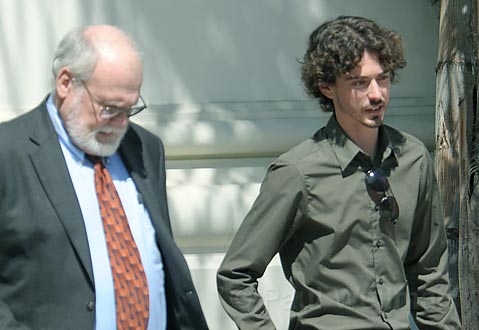
On August 9, 2000, Markowitz, Pressley, and Rugge were alone in the Lemon Tree Inn after a night of partying when Ryan Hoyt entered with a Tec-9 gun. Other witnesses such as Ben Markowitz and Affronti had seen this same gun at Hollywood’s house, and they thought it to be his. Hoyt and Pressley drove to Lizard’s Mouth, where Pressley was directed to find and dig a shallow grave. Afterward, they returned to the spot with Rugge and Markowitz, who both calmly walked to the spot where the hole was located with Hoyt; Pressley said he waited at the bottom of the hill. From there, he heard “a rapid succession” of gunshots. Pressley was convicted of second-degree murder and released from a youth correctional facility in 2007.
Natasha Adams
Age 17 at the time of Markowitz’s murder, Adams hung out with Pressley, Rugge, and Carpenter on a regular basis during that time. She partied with Markowitz at Rugge’s house and at the Lemon Tree Inn hotel the night that Markowitz was murdered. She said that she encouraged Markowitz to escape throughout the ordeal, but he refused, responding that he would “stick it out” for his brother.
Casey Sheehan
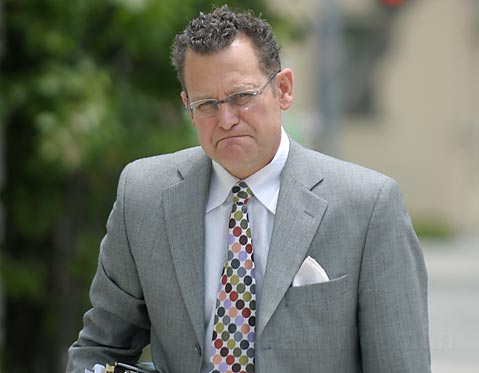
Sheehan was a friend of Hollywood’s who apparently lent Hollywood the car used to transport Markowitz to Lizard’s Mouth. Judge Brian Hill determined that Sheehan was a witness adverse to the prosecution. Hollywood’s friend described a party he threw for Hoyt the day after the murder, and said he overhead an argument between Hoyt and Hollywood where the shooter said he “fucked up”, that he and Jesse Rugge (who was also convicted in the kidnapping) had a “very heated” argument, and that Hollywood had asked Hoyt why he didn’t handle the situation as instructed. Defense attorney Alex Kessel, who’s intent is to disconnect Hollywood from the killing, got Sheehan to admit that Hoyt was not blaming Hollywood for the problem, but rather blaming himself.
After news reports about the killing surfaced, Sheehan said Hoyt’s demeanor changed and he was scared. He had told Sheehan previously his debt had been cleared by killing the boy. But he never said the debt had been owed to Hollywood. He also admitted it wasn’t uncommon for Hollywood to borrow his car.
Ben Markowitz
In the prosecution’s theory, Hollywood kidnapped the witness’s half-brother and later orchestrated his murder in revenge for a $1,200 drug debt owed by Ben Markowitz. The defense, meanwhile, has avoided discussing the drug debt, instead claiming that Hollywood was afraid of Ben Markowitz. In the defense’s cross-examination of witnesses who knew Hollywood, attorneys James Blatt and Alex Kessel focused on voicemails that Markowitz left the defendant, in which he threatened the whole Hollywood family.
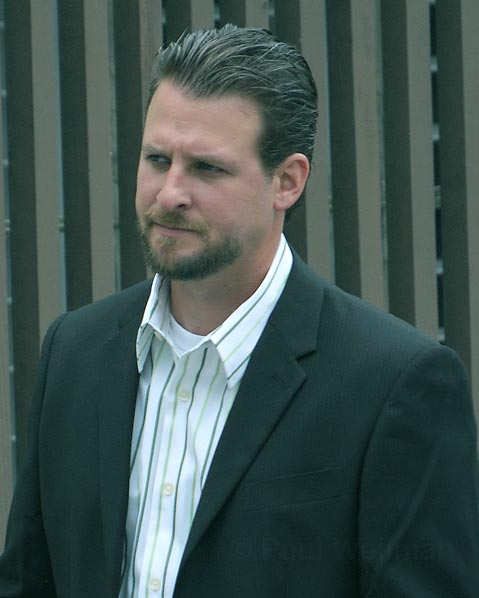
Multiple witnesses have testified that Hollywood claimed that Ben Markowitz broke the windows in his home and had killed his dog. In his direct examination, Ben Markowitz told Lynn that he became friends with Hollywood in 1999 after buying marijuana from him. Months later, Markowitz owed Hollywood a $1,200 payment for ecstasy pills that didn’t work. When he refused to pay the debt, their friendship deteriorated. After leaving each other a series of angry voicemails, Markowitz spotted Hollywood waiting outside his home. Markowitz had never given the defendant his address, and he took his presence as a threat. He responded by purchasing a gun, moving out, and leaving Hollywood another voicemail, in which he claims to have said, “Yeah, you know where I live, but I know where you live too, motherfucker.”
This is the voicemail the defense has been referencing multiple times throughout the trial, using it to claim that Markowitz threatened the whole Hollywood family.
Gabriel Ibarra
Ibarra was living with Hoeflinger at the time of the kidnapping, and he saw Markowitz’s hands and mouth bound with duct tape in the back bedroom of his apartment. Ibarra did not report the event because he did not want to get involved, and he felt threatened by Hollywood. He said that Hollywood pointed to a bulge in his waistband and instructed Ibarra to “keep [his] fucking mouth shut” about what he saw.
Shauna Vasquez
Vasquez was already at Hoeflinger’s house on August 6, 2000, when Rugge, Hollywood, Markowitz, and others entered. She said she went into Hoeflinger’s bedroom to put on her makeup and saw that Nick Markowitz’s hands were bound together with duct tape. She remembered seeing Hollywood and Rugge sitting in the back bedroom with him, as well. “I was freaking out,” she said. However, she continued to put on her makeup and then left the bedroom. Hollywood then had a conversation alone with Vasquez in the living room.
“He told me that Nicholas’ brother owed him money and had broken windows in his house,” she said. Vasquez, her voice emotional, said that Hollywood told her not to discuss their location in front of Markowitz. Vasquez and others then went to the barbeque as originally planned. She said they came home a few hours later and she was relieved to find Markowitz, now free of duct tape, playing video games with Rugge.
Jaymi Dickensheet
Dickensheet also partied at Richard Hoeflinger’s house on August 6, 2000. Dickensheet said that she saw Markowitz, Hollywood, and three other people enter Hoeflinger’s house and walk into the back bedroom, and she said that Hollywood seemed like he was “on a mission.” Dickensheet remembered being told by Jesse Rugge, who is serving a life sentence for his involvement in the murder and kidnapping, that the group was holding onto Markowitz until they found his brother. “He wasn’t, from what I could see, held against his will,” Dickensheet said.
Emilio Jerez
Hoeflinger’s roommate at the time, Jerez admitted he “was not completely honest at first with the police because he was scared of the whole situation with Jesse Hollywood.”
At Rugge’s trial, Jerez contradicted himself by saying he never saw Markowitz being tied up while they were at his friend’s house in August 2000. Jerez said Friday he remembers seeing “Hollywood and Rugge in a room with Markowitz, who was sitting on a bed.”
Jerez said that when Hollywood saw Jerez, he whispered into Rugge’s ear. Rugge then approached Jerez and told him not to say anything to anyone about the situation. This frightened Jerez to the point where he felt he could not reveal what he knew to the police.
Though he felt threatened, he didn’t think Markowitz was in danger. He later left to go to a barbeque.
Lars Wilkstrom
Wilkstrom was at Lizard’s Mouth, drawn to the grave of Nicholas Markowitz by a group of hikers. He described an odor similar to that of a dead animal, only stronger. He spotted a pair of jeans through the dirt, and photographed the scene nearby. It took nearly two hours for deputies to arrive.
Lisa Hemman
At the time working in the Sheriff’s Department Forensic Unit, Hemman described for the jury the body of Markowitz in the grave at Lizard’s Mouth.
David Barber
Barber, a criminologist from the California Department of Justice crime lab, testified about the Tec-9 weapon used to kill Markowitz and found buried with the body at the scene. He didn’t test the weapon at the scene, and said he had rarely worked a case where the weapon was left at the scene of a shooting crime.
Paul Kimes
Kimes, an investigator with the District Attorney’s office, testified in order to impeach Lasher’s claim that the prosecution threatened to charge her with murder. He said that prosecuting attorney Almgren was actually signing Lasher’s immunity papers at their most recent meeting, but that she was very upset and would not read her immunity papers to understand what she was signing. He admitted the immunity wasn’t explained very well.
Stephen Hogg
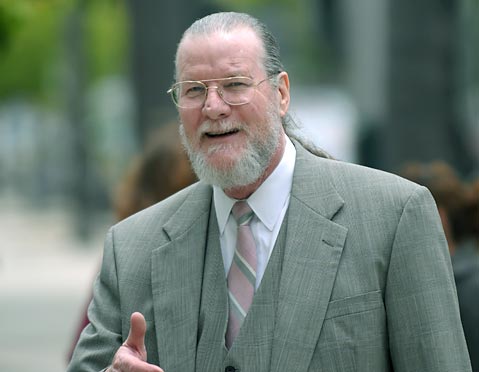
A family friend of the Hollywood’s and a criminal defense attorney, Hogg said that Hollywood came to his house on August 8, 2000, explaining that his friends had kidnapped someone. But he also told Hogg that the boy was drinking, smoking, and playing video games with his captors. “I’ve never ever heard of a kidnapping where the kidnappers are partying with the victim,” Hogg said. He therefore didn’t think that the victim was in grave danger, and was instead more concerned about Hollywood. “I said to him, ‘If your friends hurt this guy, or if your friends asked for money from him, they can get life,'” Hogg testified. But he said that Hollywood refused to go to the police.
He also denied a claim from Saulsbury that he told Hollywood to kill Markowitz.
Lt. Ronald Legault
Legault, with the sheriff’s department, was waiting at Los Angeles International Airport in 2005 to pick Hollywood up. Hollywood was returning home from Brazil, where he had lived for some time after the murder. He was captured by police and brought back to the U.S.
Dr. Robert Anthony
Anthony is a forensic pathologist with the Santa Barbara County Sheriff’s Coroners Bureau who testified in court to verify the accuracy of an autopsy performed on the victim.



